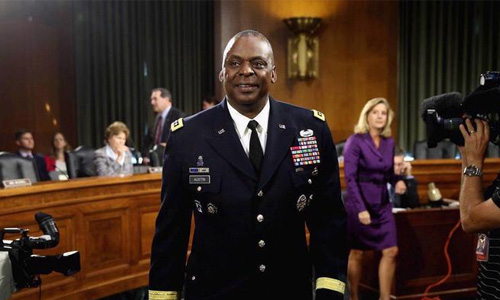US President-elect Joe Biden’s nomination of Lloyd Austin, a recently retired four-star general, as Secretary of Defense is a further welcome sign that America has come to its senses and will, after January 20 next year, no longer seek to punish its friends and reward its enemies. To demonstrate this shift to the world, Biden should, immediately on taking office, rescind President Donald Trump’s order last July to withdraw 12,000 US troops from Germany.
Without costing the US a penny, Biden would dramatically repudiate Trump’s isolationism and throw a wrench into Russian President Vladimir Putin’s divide-and-rule strategy in Europe. Reversing the troop withdrawal would also strengthen NATO, Germany, and Chancellor Angela Merkel – whose potential successor will be chosen in mid-January by her Christian Democratic Union (CDU) – as they battle Putin and homegrown anti-Western populists.
Trump claims that he wanted the US troops out because Germany was short-changing the NATO alliance on defense spending, compelling America to make up for the shortfall. But that is nonsense. And as one of the people who previously advocated it, I should know.
For decades, Republican and Democratic presidents never cared that America was spending far more on NATO than Germany was. For a while, I was convinced that they should care, so in 1986 I wrote How NATO Weakens the West, a book about German defense free-riding. So gung-ho was I about this idea that I also wrote a commentary for The Wall Street Journal entitled, “It’s Time to Change the Atlantic Alliance.”
But never did I imagine that Trump would use my now-ancient strategic argument as a wrecking ball to demolish NATO solidarity and empower Putin. True, Germany may not be spending enough on defense; the French certainly think so. But the argument that Germany is making a fool of the United States with its frugal defense spending is simply a fig leaf for Trump’s determination to reward Putin while rebuking Merkel. Putin has long wanted a reduced US troop presence in Europe, and in Trump, he found a US president who was willing to collaborate with him.
My own thinking about NATO and Germany’s contribution to it began to evolve not long after my book was published. While promoting it, I debated Lawrence Eagleburger, who was subsequently US Secretary of State under President George H.W. Bush, and met many serious, well-informed military people. I recognized then that what counted most for the US – and still does – is control over the structure and purpose of European defense, not its cost. The transatlantic Cold War-era “bargain,” according to most US military experts, was that America would pay the lion’s share of NATO’s expenses in return for leadership of European defense.
In fact, I dropped the “Germans are playing us for suckers” line, born of my wish for an effective transatlantic alliance, when I abandoned the conservative populism that had influenced my early thinking. Moreover, evidence from the 1980s shows that the military experts who criticized my book were right. The transatlantic disputes of that period were not about money, but rather over issues like siting Pershing II missiles in West Germany to counter the Soviet Union’s ballistic missiles. West Germans, because of their fraught history and strong peace movement, were wavering on the issue.
After much tumult, and true leadership on the part of the Social Democratic Chancellor Helmut Schmidt and his CDU successor Helmut Kohl, West Germany installed the Pershing IIs in 1983. And they served their purpose well: NATO traded them away in the 1987 Intermediate-Range Nuclear Forces (INF) Treaty with the Soviet Union, a key agreement in defusing the nuclear threat. The Pershing IIs were subsequently destroyed, and rumor has it that some of the scrap material wound up in special ballpoint pens at the Ronald Reagan Presidential Library, which gave them out as gifts.
Although Trump failed to make German defense spending into a major political issue in the US, it has become a contentious subject in Europe. In a recent interview with Le Grand Continent magazine, French President Emmanuel Macron – a staunch advocate of greater European sovereignty in defense matters – strongly criticized German defense minister Annegret Kramp-Karrenbauer for publishing a commentary in Politico entitled “Europe still needs America.” Europe would need America less, Macron implied, if Germany increased its defense spending.
It is clearly bad for NATO and EU unity when the Union’s two most important members are at odds about America’s role in Europe. The Western alliance needs a US security guarantee for Germany and other European countries, but this cannot come at the cost of a Franco-German split, which would be another gift to Putin.
France and Germany must heal their current defense rift, and America must maintain its security guarantee for Europe. The continent needs US boots on the ground, not only in Germany but throughout the Baltic states as well. One way out of the conundrum would be for Germany to contribute more to European defense budgets, thus providing a measure of the independence that France seeks, while keeping the US troops it wants.
Biden could start this process of reconciliation between France and Germany – and, more importantly, between the US and its NATO partners – by canceling Trump’s planned troop withdrawal. He could then use the resulting leverage and his personal contacts (Biden has attended the annual Munich Security Conference for decades and knows nearly all of the key German foreign-policy players) to persuade Germany to spend more on European defense. The main aim of such a commitment would not be to placate America, but rather to boost Macron, a genuine friend of Germany.
Home » Opinion » Getting NATO Back on Track
Getting NATO Back on Track
| Melvyn Krauss

